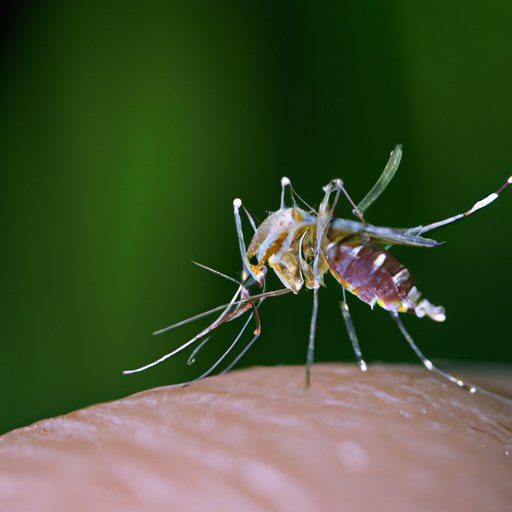Introduction
Mosquito bites are an annoying reality for many of us, but what happens when mosquitoes seem to avoid biting some people? This might sound like a good thing, but it can actually be a cause for concern. Some people may believe that they are immune to mosquito bites and therefore do not need protection against the pests. Unfortunately, this is far from true. In this article, we’ll explore why mosquitoes don’t bite some people and what you need to know to protect yourself from the risks of mosquito-borne diseases.
Why am I immune to mosquito bites? The science behind it
There are several factors that can make someone less attractive to mosquitoes. Genetic and biological differences play a role; for example, the scent of one’s skin, the amount of carbon dioxide they exhale, and the amount of lactic acid they produce can determine whether or not they will be bitten as often as others. Environmental and lifestyle factors also play a part; for example, wearing perfumes, drinking alcohol, or wearing dark clothing can attract mosquitoes. Ultimately, the more we understand about the scientific factors that make some people less attractive to mosquitoes, the better we can protect ourselves against mosquito-borne diseases.
5 reasons mosquitoes avoid biting some people
While science offers several explanations for why mosquitoes avoid biting some individuals, there are five main reasons that stand out. These include blood type, genetics, carbon dioxide output, sweat, and skin bacteria. For example, people with type O blood are often bitten more than those with other blood types, and pregnant women tend to attract more mosquitoes due to hormonal changes. Knowing what factors can attract mosquitoes is the first step in preventing bites. Wearing protective clothing and mosquito repellents with DEET is also vital in locations where mosquito-borne illnesses are present.
Mosquitoes not biting you? Here’s why you should still protect yourself from them
Even if you are one of the lucky few who are not typically bitten by mosquitoes, it’s important to protect yourself from them. Mosquitoes can carry a variety of diseases, including West Nile virus, Zika virus, and dengue fever. Mosquito bites can also cause allergic reactions in some people. Preventive measures like mosquito nets, environmental protection, and insect repellent can help to reduce the risk of being bitten and infected with a mosquito-borne illness.
The hidden dangers of mosquito bites: What you need to know
Mosquito bites can cause more than just a temporary nuisance. When mosquitoes bite, they can transmit viruses and other pathogens that can have serious health implications if left untreated. Some of these diseases include malaria, chikungunya fever, and yellow fever. Symptoms for each disease vary, but they may include fever, headaches, muscle and joint pain, and in some cases, paralysis. It’s important to keep up to date on the specific health threats in areas where you are traveling and take protective measures accordingly.
The psychological effects of mosquito bites (and why you should avoid them)
Mosquito bites can have both physical and psychological effects. In addition to the physical discomfort, people who are frequently bitten may become anxious or fearful of being around mosquitoes. This can turn into a phobia, known as entomophobia, which can make it difficult to enjoy outdoor activities. Over-the-counter anti-inflammatory medications can help to relieve symptoms like swelling and itching, as can natural remedies like aloe vera, tea tree oil, and peppermint oil.
Looking for relief from mosquito bites? Try these natural remedies
Many natural remedies can offer relief from the effects of a mosquito bite. Aloe vera can help reduce the swelling and redness caused by bites, while essential oils like tea tree oil and eucalyptus oil can act as a natural insect repellent. You can also make your own DIY repellents by using common ingredients like lemongrass, lavender, and peppermint. It’s important to note that these remedies are not a replacement for medical treatment if you begin to experience any of the symptoms associated with mosquito-borne illnesses.
Conclusion
Mosquitoes may not bite everyone, but they still pose a real threat to public health. Each person’s unique biology and circumstances determine how often they’ll be bitten and the potential risks they face. Knowing what makes mosquitoes more attracted to humans and how to protect yourself from mosquito bites can help you to stay healthy and safe while enjoying outdoor activities. By taking precautions, being aware of the dangers, and using natural remedies alongside preventive measures, you can enjoy a bite-free summer.
